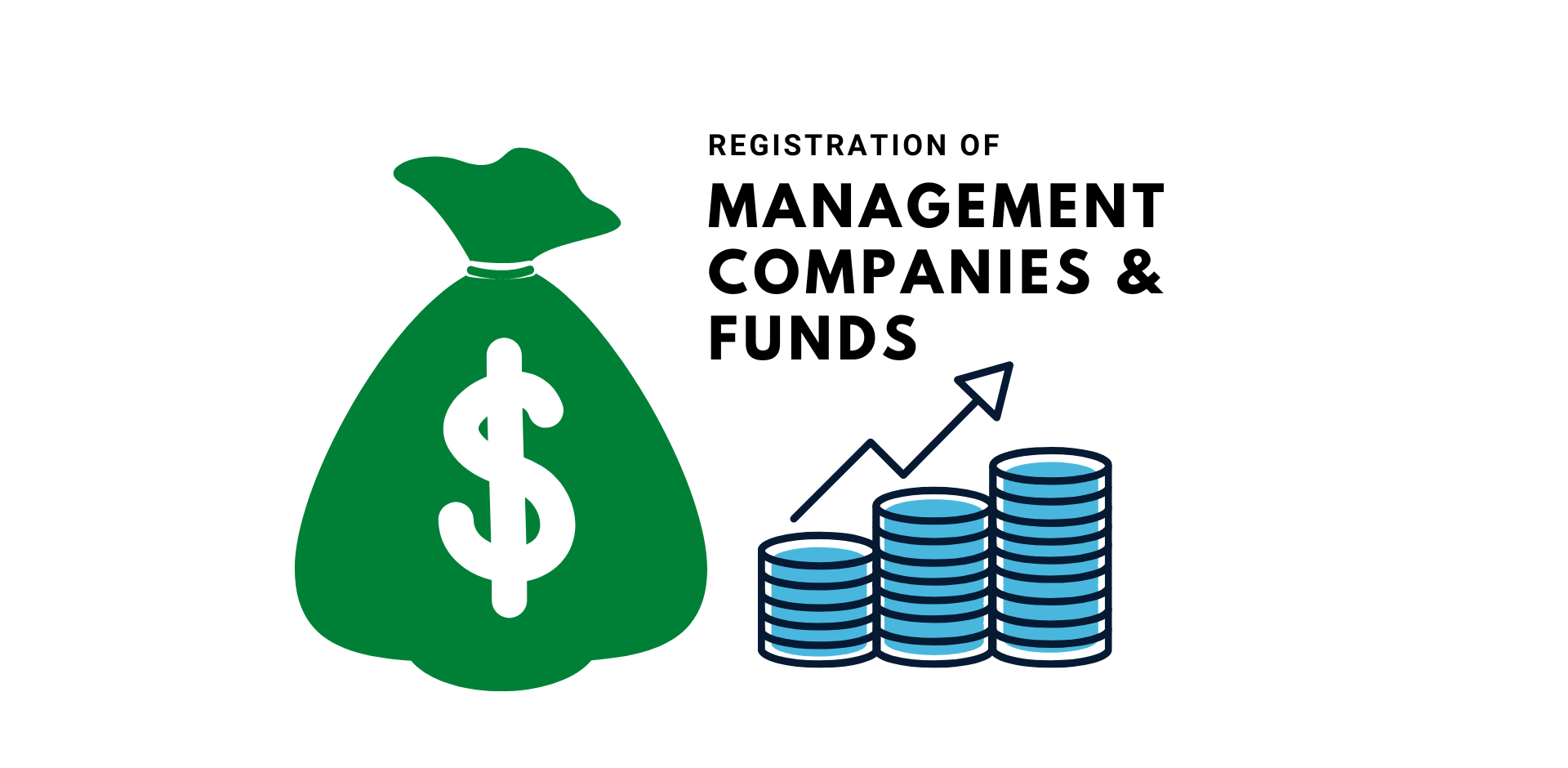Registration of Management Companies and Funds
Over the time, any asset manager who does more than plan to manage own assets faces the problem of a transparent and convenient management infrastructure.

Problem
Investors are unwilling to invest in "shadow" and opaque money management systems and are rightly often disappointed in the most talented asset managers. They are looking for a "safe haven" with a transparent structure and Government regulation and oversight, where their capital and rights are protected by law, not just by promises from the asset manager.
For the asset manager, a transparent structure and regulation is a natural progression. This applies to traditional asset management in the field of collective investment schemes, from interval real estate funds to traditional exchange-traded funds and new phenomena in the asset management market, such as crypto funds.
Those who survived the 2007-2008 crisis are aware of the importance of a transparent and understandable infrastructure of relations between the investor and the manager. The issue of AML & KYC regulations of investors remains very sensitive, an asset manager bears the same responsibility as the entire criminal chain where they unwittingly become a participant in money laundering and criminally derived assets. Regulation is not only an obligation but also a protection for all parties in the matter of capital management.
For a long time, capital management infrastructure was out of reach for small capital managers due to the high cost of building and maintaining it. But changes in EU Directive 2011/61/EU (AIFMD) regulation gave almost everyone the opportunity to enter the capital management market.
Solution
In 2016, as a result of the analysis, the Ministry of Finance made several amendments to the draft law, and a new regime of Estonian Limited Partnership Funds (LPF) was enacted by the Investment Funds Act on 14 December 2016.
LPF is an investment vehicle primarily designed for closed-end collective private equity and venture capital investments.
The new regime was designed based on the best features of the limited partnership structures of various countries traditionally considered attractive jurisdictions for collective private equity and venture capital investments, such as the UK, Luxembourg, and Jersey.
Flexibility
There is a limited number of mandatory rules with which each Limited Partnership Fund (LPF) must comply. It leaves remarkable flexibility and freedom to the partners to agree in the Limited Partnership Agreement (LPA) on the rules applicable to the Limited Partnership Fund (LPF).
Among other things, the partners have the right to regulate the following matters in the Limited Partnership Agreement (LPA):
- partnership's purpose and investment policy;
- duration of the partnership;
- partners’ contributions, including capital and loan;
- allocations, sharing, and distributions of profits;
- payment of carried interest;
- appointment, removal, and withdrawal of general and limited partners;
- powers of the partners;
- payment of fees and expenses, including management fees, establishment costs, transaction costs, and general partner’s fee income;
- transfer of partners’ interests;
- termination of the partnership.
Structure & Management
Each Limited Partnership Fund (LPF) must have at least one General Partner (GP) and one Limited Partner (LP). In addition, because it is an alternative investment fund, it must invest funds that come from at least two investors (e.g., the GP and the LP or two LPs).
A Limited Partnership Fund (LPF) may be operated as a self-managed partnership or as a limited partnership managed by a management company.
The assets of a self-managed Limited Partnership Fund (LPF) are managed by its GP. If a management company has been contracted, the management company has the authority to manage the assets pursuant to the management agreement between the Limited Partnership Fund (LPF) and the management company.
LPs may participate in managing the Limited Partnership Fund (LPF) in accordance with the rights granted to them by the Limited Partnership Agreement (LPA).
Partner's Liability
The GP has unlimited liability for the debts of the Limited Partnership Fund (LPF). The liability of an LP is limited to the amount of the LP contribution to the Limited Partnership Fund (LPF) if the LP does not participate in the day-to-day management of the Limited Partnership Fund (LPF).
To provide clarity with respect to LP liability, there is a so-called safe harbor rule, under which an LP is deemed not to participate in the day-to-day management of the Limited Partnership Fund (LPF) if, among other things, the LP:
- represents the Limited Partnership Fund (LPF) under a specific power of attorney;
- exercises general LPs’ rights arising from laws or set forth in the Limited Partnership Agreement (LPA);
- advises the GP or the management company in matters pertaining to the management of the Limited Partnership Fund (LPF), unless such advice constitutes binding instructions, which the GP or the management company must adhere to;
- guarantees or secures the obligations of the Limited Partnership Fund (LPF);
- participates in amending the Limited Partnership Agreement (LPA);
- exercises voting rights or otherwise expresses an opinion on any of the following matters:
- continuing or terminating the activities of the Limited Partnership Fund (LPF);
- concluding transactions for the acquisition of assets by the Limited Partnership Fund (LPF);
- transferring or encumbering partners’ interests;
- amending the investment policy of the Limited Partnership Fund (LPF);
- the merger of the Limited Partnership Fund (LPF);
- appointment of a partner;
- withdrawal or removal of a partner;
- making a transaction between the Limited Partnership Fund (LPF) and its partner.
Establishment
A Limited Partnership Fund (LPF) is established by the completion of its Limited Partnership Agreement (LPA) and its registration with the Estonian Commercial Register (Äriregister).
The Limited Partnership Fund (LPF) is registered at Estonian Commercial Register on the basis of an application executed and filed by:
- the GP or each GP if the Limited Partnership Fund (LPF) has more than one GP,
- and unless the Limited Partnership Fund (LPF) is established as a self-governed partnership, the management company.
A statement from the Estonian FSA (Finantsinspektsioon) confirming that the GP or the management company is duly registered or authorized as an alternative investment fund manager (AIFM) must be attached to the application.
An application will normally be processed within five business days and the Limited Partnership Fund (LPF) will be registered.
Confidentiality of LP-s
A Limited Partnership Fund (LPF) is not required to disclose the identity of its LPs or the amount of investment made by each LP.
Authorizations
A Limited Partnership Fund (LPF) is an Alternative Investment Fund (AIF) within the meaning of Directive 2011/61/EU (AIFMD).

For this reason, at least one GP or the management company must be:
- authorized to operate as an alternative investment fund manager (AIFM) in Estonia or another Member State of the European Economic Area, or
- registered with the Estonian FSA (Finantsinspektsioon) as an alternative investment fund manager (AIFM).
An Estonian entity may be registered as an alternative investment fund manager (AIFM) with the Estonian FSA (Finantsinspektsioon) if it intends to act as an alternative investment fund manager (AIFM) but is not required to obtain authorization as an alternative investment fund manager (AIFM) under the exemption set out in Article 3 of the AIFMD. In order to register with the Estonian FSA (Finantsinspektsioon), the entity must provide the FSA with information about the Limited Partnership Fund (LPF) and its intended activities. As an alternative investment fund manager (AIFM), it must file its annual reports with the Estonian FSA (Finantsinspektsioon).
Tax Transparency
The existence of a fiscally transparent fund vehicle has been widely recognized as a crucial condition for creating an attractive environment for structuring investment funds. This condition has now been met in Estonia through the introduction of a full tax transparency regime for Limited Partnership Funds (LPF).
Tax transparency means that an Limited Partnership Fund (LPF) is not considered as a taxpayer or resident in Estonia for the purposes of Estonian tax laws, and that income generated by an Limited Partnership Fund (LPF) is immediately allocated to its investors in proportion to their shares in Limited Partnership Fund (LPF).
One of the objectives of such a see-through approach is to ensure that the LPF's foreign investors are treated for tax purposes in the same way as if they were investing directly in company shares.
An important consequence of tax transparency is that foreign investors should normally have full access to double taxation treaties between the investor's state of residence and the source state of the relevant income.
In the case of non-resident investors, the Limited Partnership Fund's (LPF) income allocated to such investors in most cases is not taxed in Estonia. Such income is taxed in Estonia only in situations where the same income if earned directly by a non-resident, would be taxed in Estonia. The above situations include only income from Estonian real estate (capital gains, rental income, and interest income). The non-resident investors have to declare the capital gains obtained through the Limited Partnership Fund (LPF) only if such income is taxable in Estonia.
A Limited Partnership Fund (LPF) itself must file annual returns with the Internal Revenue Service regarding the income earned, the investors in the LPF, the share of the LPF's income allocated to each investor, and the tax residency of each investor.
Our Offer
AlphaLAW team consists of specialists who have strong experience in capital management and understand the peculiarities of capital management, who will help to understand and handle the issues of the organization of the AIFM infrastructure, while our experienced lawyers will take care of all issues, from the construction of the structure of the management company, its registration with the FSA, the preparation of the AIF prospectus and the preparation of the necessary documents, the filing and defense of the prospectus with the FSA and until the registration of the LPF in the Estonian Commercial Register (Äriregister). Upon additional agreement, we also support the funds in their day-to-day operations after registration.






